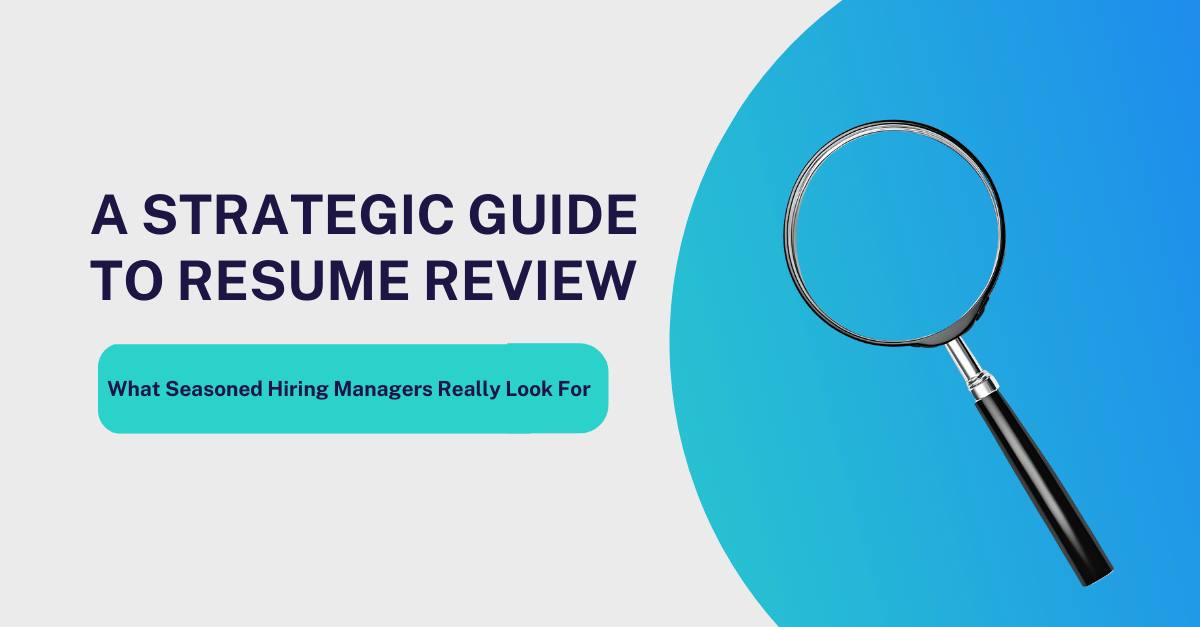The resume review process is often the first point of contact between a potential candidate and your organization — and getting it right can make all the difference. While a resume may only offer a snapshot, it often contains the earliest indicators of whether a candidate has the capability, mindset and experience to thrive in your environment.
In today’s competitive hiring landscape, knowing what to look for and how to look for it can elevate your hiring process and save valuable time. Below, we share a refined approach to resume evaluation rooted in strategy, experience and alignment with long-term organizational goals.
1. Relevance to the Role: More Than Keyword Matching
The most effective resumes demonstrate intentional alignment with the position at hand. Go beyond simply scanning for keywords, look for a narrative that connects past roles and achievements to your company’s current needs.
Ask: “Has the candidate tailored their resume to reflect the priorities of this specific role? Do their past results indicate the ability to solve challenges similar to the ones your team is facing?”
Relevance is not just about past job titles; it’s about contextual fit.
2. Evidence of Results, Not Just Responsibilities
Competency today is measured in outcomes. Candidates who demonstrate their value through quantifiable results are often those who understand business impact.
Look for statements such as: “Reduced operational costs by 18% through process automation.” “Led cross-functional teams to deliver a product three months ahead of schedule.”
These candidates aren’t just doing the work; they’re delivering measurable progress.
3. Career Trajectory and Growth Patterns
A well-structured career path can signal ambition, adaptability and performance. Look for signs of progression, such as increased responsibility, lateral growth into broader roles or internal promotions. Also note:
- Time spent in each role: Too short may signal instability; too long without growth may signal stagnation.
- Context of changes: Are transitions between roles strategic or reactive?
Understanding their career story provides insight into their professional judgment.
4. Professionalism, Structure and Clarity
A resume should reflect a candidate’s ability to communicate clearly and professionally, skills that are critical in nearly every role. Assess whether the resume is logically formatted, free from errors and easy to navigate.
What to evaluate: Are employment dates and job responsibilities clearly outlined? Is the tone professional without being overly templated? Does the candidate demonstrate attention to detail through formatting and consistency? Poorly presented resumes often foreshadow issues with communication, organization or follow-through.
5. Educational and Technical Credentials
While not always the sole determining factor, educational background and technical certifications still matter, particularly in roles that require regulatory compliance, specialized training or deep technical knowledge. That said, consider the totality of a candidate’s experience. In many cases, demonstrated ability and impact outweigh a lack of formal education, especially in dynamic or emerging fields.
6. Common Red Flags and When They Deserve Context
Not all warning signs are immediate deal-breakers, but they should trigger thoughtful consideration or clarification.
- Frequent Job Changes: May indicate a lack of commitment or could reflect career exploration or industry disruption.
- Employment Gaps: Could stem from personal development, caregiving or economic conditions. If unexplained, address during the interview.
- Overly Vague Language: “Assisted with,” “worked on,” or “helped deliver” without detail may signal limited ownership.
- Ignoring Application Instructions: Missing requested materials suggests poor attention to detail and can be predictive of future issues.
Your goal isn’t to eliminate every imperfect candidate — it’s to determine who deserves a deeper conversation.
Resumes Tell a Story—Read It Strategically
At its core, resume review is not about scanning for keywords or hunting for flaws. It’s about strategic filtering, identifying which candidates have not only done the work but done it in ways that align with your mission, goals and culture.
By focusing on relevance, impact, growth and clarity, you’ll not only reduce hiring friction, you’ll elevate the quality of your team long-term. And if your team is navigating a high volume of applicants or struggling to attract the right profiles, we are here to help.
Century Group’s team brings clarity and structure to every phase of the hiring process, ensuring you’re meeting the right people, every time. Let’s talk about how we can support your next great hire.













